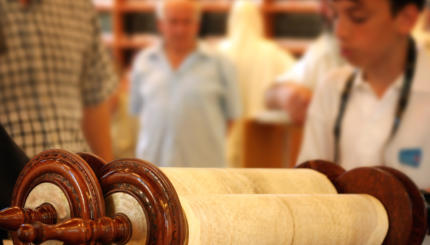One of my biggest pet peeves is when people mispronounce Hebrew words, especially when the person in question is leading davening. Yes, there are alternate pronunciations in some cases, and various accents don’t really bother me, but the vowels printed in the siddur are there for a reason. The words are pronounced a certain way because that way has relevant meaning. If you change the pronunciation just because it sounds better to you, you can be seriously altering the meaning of a text.
Mostly what happens when people mispronounce words is that they make whatever they’re trying to say unintelligible, but they can also make things outright wrong/sacrilegious. The most common problem in this area, based on my very unscientific observation, is various permutations of the Hebrew root K.D.SH., meaning holiness. Today at minyan the person leading prayers read a line from Aleinu, and instead of saying, ‘Lifnei melekh, malkhei hamlakhim, hakadosh baruch hu‘, he said ‘Lifnei melekh, malkhei hamlakhim, hakodesh baruch hu.’
Hakadosh and hakodesh–not the same thing, people!! In fact, hakodesh is just grammatically incorrect.
And while I’m on the topic, I’d also like to register a complaint about people who, while singing Psalm 29, say, “Yahil Adoshem midbar kodesh.” Loosely translated, this would mean, “God shakes the holy wilderness.” Unfortunately, what the text actually says is, “Yahil Adoshem midbar kadesh.” “God shakes the wilderness of Kadesh.” Kadesh is the name of the dessert, it’s not a description of the desert.
And while we’re on the subject of things people do while reading Hebrew that make me want to scream: let’s talk about where we put the accent on Hebrew words. In English, we tend to put the accent on the penultimate syllable of a word. So my sister’s name is DEE-na, as opposed to Dee-NA. I’m typing on a com-PU-ter, rather than a COM-puter. You get the picture. There’s a special Hebrew word for putting the accent on the penultimate syllable: mil’el. But in Hebrew, the accent is generally on the last syllable, so when we’re discussing something that’s holy we’d say Ka-DOSH as opposed to KA-dosh. And when we say a blessing we’re saying a bra-KHA as opposed to a BRA-kha. A word with an accent on the last syllable is a mil’ra word. Most of the time in Hebrew you can assume something is a mil’ra word unless you see a little extra vertical line under the word (see it here under the vav and the khaf). That extra vertical line is telling you to accent the word there, instead of wherever else you might have thought to put it. So maybe the next time you’re looking in a siddur, pay attention to your pronunciation and accents, okay? If you don’t, I’ll be silently judging you.
minyan
Pronounced: MIN-yun, meen-YAHN, Origin: Hebrew, quorum of 10 adult Jews (traditionally Jewish men) necessary for reciting many prayers.
siddur
Pronounced: SIDD-ur or seeDORE, Origin: Hebrew, prayerbook.



